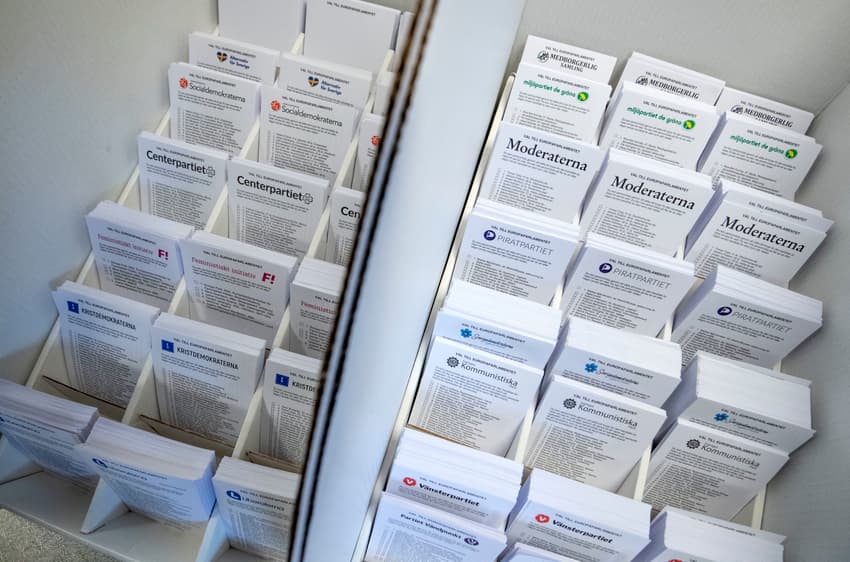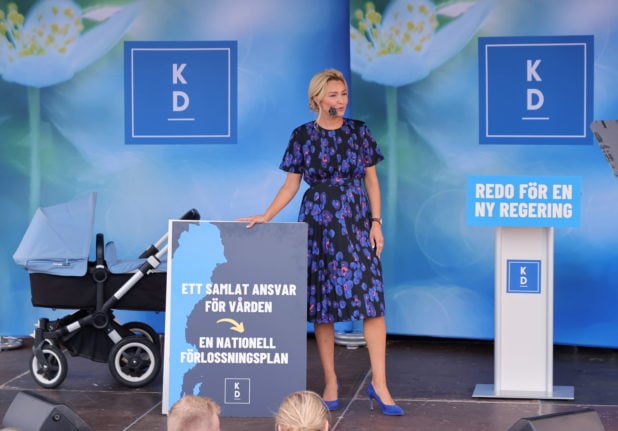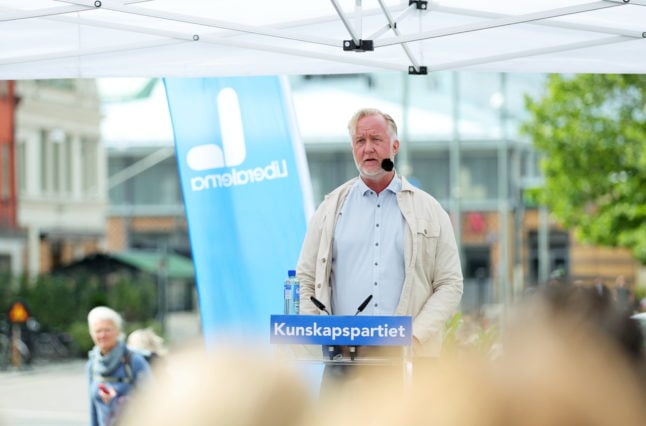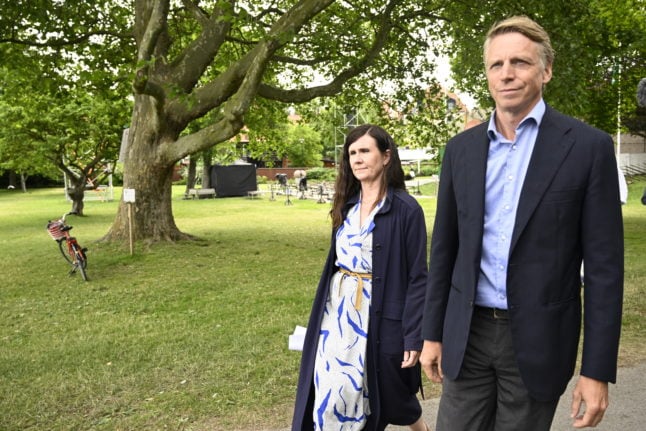UPDATED: What election pledges have Sweden's smaller political parties made this year?

In the second part of The Local's election pledge series, we look into the election pledges of Sweden's four smallest parties: the Left Party, the Christian Democrats, the Liberals and the Greens.
This is the second part of a two-part series on Sweden's political parties' election pledges for 2022. You can read the first part here, covering the Social Democrats, the Moderates, the Sweden Democrats and the Centre Party.
Left Party
The Left Party's election pledge is to "create a more secure Sweden". It will do this by "taking back control over welfare and making life better for normal people", after "many years of market solutions and privatisation".
Another important issue for the Left Party, it says, is the "climate transition and what needs to be done to solve the climate crisis".
In its 17-page election platform document, the Left Party lists a range of topics including the climate, job security, education, equal healthcare, protection of an independent cultural sector and co-owned welfare across the country.
Left Party Nooshi Dadgostar kicks off her election tour in Piteå, northern Sweden. Photo: Pär Bäckström/TT
On the climate, the Left Party says that "investments in green technology, industry and infrastructure, expanded energy capacity and strengthened governance based on new, tightened climate goals is needed".
"Industries need to adapt from fossil fuels to renewables with the help of large state investments," the Left Party says, proposing "a green transition-fund, where the state uses its financial muscles, and where money is transferred from dirty companies to climate and environmentally friendly production."
The Left Party is also critical of Sweden's right-wing parties in its election pledge, stating that right-wing politics "is about attacking immigrants, the sick, unemployed and people with disabilities, and limiting our access to welfare."
Left Party proposals to make Sweden more secure include building more housing and lowering rent, introducing a progressive property tax which would tax "luxury properties more, while the majority of homeowners would not have higher taxes", rebuilding the pension system so that "you can live off your pension, not just survive," and improving unemployment insurance (a-kassa), so that "the unemployed know they have good a-kassa, and don't need to worry about moving to a cheaper apartment, selling their house or not having food on the table."
The Left Party also wants to improve job security and reduce gig work, temporary employment and part time jobs, adding that "workers with foreign backgrounds are overrepresented in insecure, low paid and stressful jobs".
"None of us should have to deal with racism at work or be dependent on their employer in order to be able to stay in Sweden," the Left Party says.
Christian Democrat leader Ebba Busch holds her summer election speech at Hönö on Sweden's west coast.
Photo: Adam Ihse/TT
Christian Democrats
In Christian Democrat leader Ebba Busch's summer speech in the run-up to September's election, she highlighted issues such as healthcare, living costs and electricity production.
Busch also highlighted policing and law and order issues, such as giving the police more resources to fight gang crime, introducing sentences for antisocial crimes against the police and installing more security cameras.
On healthcare, the Christian Democrats proposed a national plan for maternity care, in an election pledge that the party sees as the first stage in its plan to replace Sweden’s regional health authorities with a national health service.
“Swedish healthcare is suffering from a system failure, which is spelled ‘regions',” Busch said in her summer speech.
The plan would see the reopening of closed maternity clinics and wards, and a guarantee that threatened clinics and wards be kept open.
On living costs, Busch highlighted fuel prices, promising to lower petrol prices by five kronor and diesel by nine kronor, by reducing the reduktionsplikt, a law which forces companies selling fossil fuels to lower their emissions by mixing their fuels with more expensive, more environmentally friendly biofuels.
On electricity production, Busch called for a reopening of the Ringhals nuclear reactors as well as expanding Sweden's water and wind power production, "but only where suitable".
Liberal party leader Johan Pehrson holds his summer election speech in Gothenburg. Photo: Adam Ihse/TT
Liberals
The Liberals' most important election policies, according to their website, are schools and education, integration and the climate.
On schools, the Liberals have proposed a national campaign to bring order to Swedish schools, which the party is calling an ordningslyft, literally “order lift”.
The campaign will include an “order contract”, signed by all pupils and parents, and five other proposals, of which two are new.
The two new proposals are that the Swedish National Agency for Education (Skolverket) state clearly that pupils have a responsibility for order in schools, and must come in time for lessons, look after their school books, use decent language, and arrive rested for lessons. Parents also share responsibility, and must, for instance, come to parent-teacher meetings.
On integration, the Liberals' main policy is a so-called förortslyft or "suburb lift", aimed at reducing the number of areas classed as "vulnerable" where police struggle to combat crime, so that no areas of Sweden fall into this category by 2030.
The Liberals say that many "new Swedes end up in crowded suburbs marked by crime and low school results," and that "many have their freedom and opportunities limited as they lack jobs and lack language ability."
Their goal for combatting the exclusion they see in Sweden is to make it "easier to get a job quickly and support yourself financially - even for those who don't speak good Swedish or lack an education".
To do this, they propose introducing "entry-jobs for the young and new arrivals with a slightly lower salary for the first job and simpler rules".
They also aim to prevent and work to dismantle "parallel societies", by combatting honour-related violence "through more knowledge, but also stricter penalties", and introducing "a stop for new religious free schools as they prevent integration".
On the climate, the Liberals want to see more investments in solar, wind and nuclear power, as well as "more electricity and cheap electricity" in order to succeed with the "climate transition", as well as encouraging people to buy electric cars, introducing electric public transport and electric goods transport.
In addition to this, in order to lower energy prices, the Liberals propose lowering taxes on electricity - specifically, lowering VAT and excise tax on electricity.
Green Party co-leaders Märta Stenevi and Per Bolund at Almedalen.
Photo: Henrik Montgomery/TT
Green Party
The Green Party has collected 19 "green points" as their election manifesto, with a clear focus on - unsurprisingly - green issues, such as the climate transition, cheap and clean energy, protection of nature and making it easier to travel in a climate-smart manner.
There are also a number of issues which are not strictly environmental or climate related, but reflect a focus on issues such as equality and peace. Topics in this category include "good healthcare on equal terms", "equal schools", a "racism-free society" and "a Sweden which stands up for peace and security", which no doubt refers to their anti-Nato stance.
The party's list its three main focus areas as being the climate, equality and democracy and human rights.
On the climate, its main goals are to stop climate change, protect biodiversity, transition to a society which "stays within the boundaries of nature" and "build a future to look forwards to".
To do this, it will "tighten Sweden's climate goals based on the best research available", "support the climate transition in all parts of society, in all branches and across the country", "introduce ambitious climate law at EU level and legislate for a European, binding emissions budget", "invest in on-time trains across Sweden, more night trains to Europe, a European trains union for simpler train journeys in Europe and new high speed trains", and "replace fossil fuels and diesel with 100% renewable fuel and electricity in Sweden and in the EU".
On equality, the Green Party's goals are to end male violence against women, stop honour-related violence, for women to have more power and better salaries and pensions, promote equal responsibility for home and children and continue to "promote feminist foreign policy for the climate, aid and peace".
Some of it's policy proposals on these points include encouraging state-owned employers to introduce equal salaries and a right to full-time work, an increase on guarantee pensions for those with little or no income in Sweden, introducing earmarked parental leave days for each parent and introducing female quotas in listed companies and state-owned companies.
On democracy and human rights, the Greens want to make it more difficult to change Sweden's constitution, improve the rights of minorities, protect free media and protect public service in Sweden's constitution, introduce a national citizenship initiative system (including, for example, legislation proposed by citizens), increase transparency in the public sector and lower the voting age to 16.
Comments
See Also
This is the second part of a two-part series on Sweden's political parties' election pledges for 2022. You can read the first part here, covering the Social Democrats, the Moderates, the Sweden Democrats and the Centre Party.
Left Party
The Left Party's election pledge is to "create a more secure Sweden". It will do this by "taking back control over welfare and making life better for normal people", after "many years of market solutions and privatisation".
Another important issue for the Left Party, it says, is the "climate transition and what needs to be done to solve the climate crisis".
In its 17-page election platform document, the Left Party lists a range of topics including the climate, job security, education, equal healthcare, protection of an independent cultural sector and co-owned welfare across the country.
On the climate, the Left Party says that "investments in green technology, industry and infrastructure, expanded energy capacity and strengthened governance based on new, tightened climate goals is needed".
"Industries need to adapt from fossil fuels to renewables with the help of large state investments," the Left Party says, proposing "a green transition-fund, where the state uses its financial muscles, and where money is transferred from dirty companies to climate and environmentally friendly production."
The Left Party is also critical of Sweden's right-wing parties in its election pledge, stating that right-wing politics "is about attacking immigrants, the sick, unemployed and people with disabilities, and limiting our access to welfare."
Left Party proposals to make Sweden more secure include building more housing and lowering rent, introducing a progressive property tax which would tax "luxury properties more, while the majority of homeowners would not have higher taxes", rebuilding the pension system so that "you can live off your pension, not just survive," and improving unemployment insurance (a-kassa), so that "the unemployed know they have good a-kassa, and don't need to worry about moving to a cheaper apartment, selling their house or not having food on the table."
The Left Party also wants to improve job security and reduce gig work, temporary employment and part time jobs, adding that "workers with foreign backgrounds are overrepresented in insecure, low paid and stressful jobs".
"None of us should have to deal with racism at work or be dependent on their employer in order to be able to stay in Sweden," the Left Party says.
Photo: Adam Ihse/TT
Christian Democrats
In Christian Democrat leader Ebba Busch's summer speech in the run-up to September's election, she highlighted issues such as healthcare, living costs and electricity production.
Busch also highlighted policing and law and order issues, such as giving the police more resources to fight gang crime, introducing sentences for antisocial crimes against the police and installing more security cameras.
On healthcare, the Christian Democrats proposed a national plan for maternity care, in an election pledge that the party sees as the first stage in its plan to replace Sweden’s regional health authorities with a national health service.
“Swedish healthcare is suffering from a system failure, which is spelled ‘regions',” Busch said in her summer speech.
The plan would see the reopening of closed maternity clinics and wards, and a guarantee that threatened clinics and wards be kept open.
On living costs, Busch highlighted fuel prices, promising to lower petrol prices by five kronor and diesel by nine kronor, by reducing the reduktionsplikt, a law which forces companies selling fossil fuels to lower their emissions by mixing their fuels with more expensive, more environmentally friendly biofuels.
On electricity production, Busch called for a reopening of the Ringhals nuclear reactors as well as expanding Sweden's water and wind power production, "but only where suitable".
Liberals
The Liberals' most important election policies, according to their website, are schools and education, integration and the climate.
On schools, the Liberals have proposed a national campaign to bring order to Swedish schools, which the party is calling an ordningslyft, literally “order lift”.
The campaign will include an “order contract”, signed by all pupils and parents, and five other proposals, of which two are new.
The two new proposals are that the Swedish National Agency for Education (Skolverket) state clearly that pupils have a responsibility for order in schools, and must come in time for lessons, look after their school books, use decent language, and arrive rested for lessons. Parents also share responsibility, and must, for instance, come to parent-teacher meetings.
On integration, the Liberals' main policy is a so-called förortslyft or "suburb lift", aimed at reducing the number of areas classed as "vulnerable" where police struggle to combat crime, so that no areas of Sweden fall into this category by 2030.
The Liberals say that many "new Swedes end up in crowded suburbs marked by crime and low school results," and that "many have their freedom and opportunities limited as they lack jobs and lack language ability."
Their goal for combatting the exclusion they see in Sweden is to make it "easier to get a job quickly and support yourself financially - even for those who don't speak good Swedish or lack an education".
To do this, they propose introducing "entry-jobs for the young and new arrivals with a slightly lower salary for the first job and simpler rules".
They also aim to prevent and work to dismantle "parallel societies", by combatting honour-related violence "through more knowledge, but also stricter penalties", and introducing "a stop for new religious free schools as they prevent integration".
On the climate, the Liberals want to see more investments in solar, wind and nuclear power, as well as "more electricity and cheap electricity" in order to succeed with the "climate transition", as well as encouraging people to buy electric cars, introducing electric public transport and electric goods transport.
In addition to this, in order to lower energy prices, the Liberals propose lowering taxes on electricity - specifically, lowering VAT and excise tax on electricity.
Photo: Henrik Montgomery/TT
Green Party
The Green Party has collected 19 "green points" as their election manifesto, with a clear focus on - unsurprisingly - green issues, such as the climate transition, cheap and clean energy, protection of nature and making it easier to travel in a climate-smart manner.
There are also a number of issues which are not strictly environmental or climate related, but reflect a focus on issues such as equality and peace. Topics in this category include "good healthcare on equal terms", "equal schools", a "racism-free society" and "a Sweden which stands up for peace and security", which no doubt refers to their anti-Nato stance.
The party's list its three main focus areas as being the climate, equality and democracy and human rights.
On the climate, its main goals are to stop climate change, protect biodiversity, transition to a society which "stays within the boundaries of nature" and "build a future to look forwards to".
To do this, it will "tighten Sweden's climate goals based on the best research available", "support the climate transition in all parts of society, in all branches and across the country", "introduce ambitious climate law at EU level and legislate for a European, binding emissions budget", "invest in on-time trains across Sweden, more night trains to Europe, a European trains union for simpler train journeys in Europe and new high speed trains", and "replace fossil fuels and diesel with 100% renewable fuel and electricity in Sweden and in the EU".
On equality, the Green Party's goals are to end male violence against women, stop honour-related violence, for women to have more power and better salaries and pensions, promote equal responsibility for home and children and continue to "promote feminist foreign policy for the climate, aid and peace".
Some of it's policy proposals on these points include encouraging state-owned employers to introduce equal salaries and a right to full-time work, an increase on guarantee pensions for those with little or no income in Sweden, introducing earmarked parental leave days for each parent and introducing female quotas in listed companies and state-owned companies.
On democracy and human rights, the Greens want to make it more difficult to change Sweden's constitution, improve the rights of minorities, protect free media and protect public service in Sweden's constitution, introduce a national citizenship initiative system (including, for example, legislation proposed by citizens), increase transparency in the public sector and lower the voting age to 16.




Join the conversation in our comments section below. Share your own views and experience and if you have a question or suggestion for our journalists then email us at [email protected].
Please keep comments civil, constructive and on topic – and make sure to read our terms of use before getting involved.
Please log in here to leave a comment.